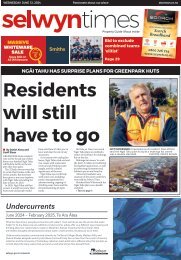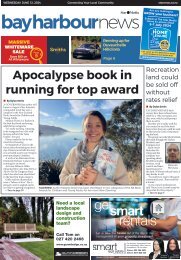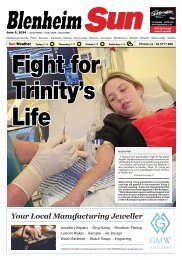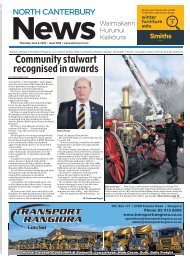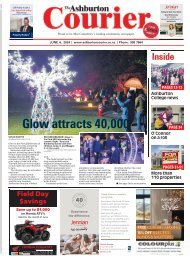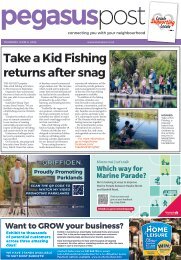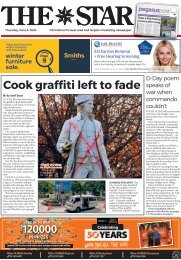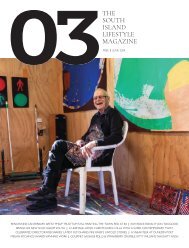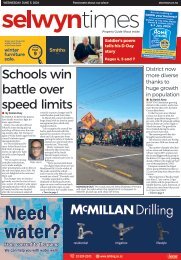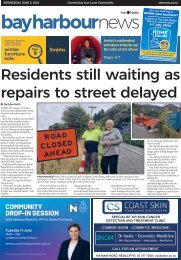Style: January 13, 2021
Create successful ePaper yourself
Turn your PDF publications into a flip-book with our unique Google optimized e-Paper software.
24 <strong>Style</strong> | Feature<br />
He’s been busy working on his house when he takes the<br />
phone call. But within seconds, he seems to almost physically<br />
shift gear as he delves into the vast tracts of history he holds<br />
in his head and the piles of notes he has. Pahia is named after<br />
Tahu Pahi (Ngāti Māmoe), chief of the pā on the northern<br />
shore of Foveaux Strait. Pahi drowned alongside 40 men<br />
when the Foveaux Strait claimed their double waka in 1823<br />
after a trip to Ruapuke Island to get mutton birds.<br />
He reels off this and more, before pausing to catch his<br />
breath. It is an astounding thing. Between him, Janice and<br />
Peter, they bring the story of this beautiful area to life with<br />
vivid sepia-coloured strokes.<br />
“When I was a child, we always went down to the bay,<br />
where the boats and cribs are, and at the weekend people<br />
went down there in their dozens. You went down there<br />
and you couldn’t park. It was an extraordinarily popular<br />
area,” she says of Mullet Bay.<br />
They came, says Peter, for the offerings from their<br />
dads’ boats.<br />
“They’d come into the wharf with their fishing boats and<br />
sell fish – blue cod, groper and things like that. In those<br />
days, there wasn’t much else on in the area. People would<br />
come down from Riverton or wherever. There was always<br />
a big crowd. In the ‘60s, though, when diving gear came<br />
in, that was sort of the start of the end,” he says, his voice<br />
becoming subdued.<br />
“Mum would say to us, ‘Go down and get us eight paua<br />
for tea.’ There was plenty of everything. But over the years<br />
it sort of got – greedy, that is what it was. Everyone taking<br />
more than they should’ve.”<br />
As the years wore on, Peter’s dad extended the home,<br />
adding in “beautiful big windows” after swapping timber for<br />
them with an Invercargill friend called William Smith, who<br />
was a joiner.<br />
“One of the fellas who worked there [at William Smith<br />
joinery] would come out and stay the weekend with us<br />
– he was a very good piano accordion player, so we had<br />
some pretty big nights,” Peter chuckles.<br />
And so the two Jacks and their neighbours would sit<br />
around the boatshed or crib, doing what good mates do.<br />
“They’d be playing the accordion, drinking beer, with the<br />
woman running around cooking the food and bringing it<br />
out to them. The men would be half-bombed and singing<br />
up large. They were pretty happy times,” he says.<br />
And living there was even better, says Janice.<br />
“It is an extraordinarily beautiful place. It’s calm. A nice<br />
place and you felt good being there,” she says.<br />
When she turned 18, as people did back then, she spent<br />
her weeks in Invercargill working in a milk bar as a waitress<br />
and caught a ride home with the people who lived in the<br />
brown crib. And on that drive home she would see people<br />
perched up on the hill painting.<br />
“On a rough-weather day and the rugged coastline,<br />
people say it looks like a Scottish fishing village. Many, many<br />
people have painted the area from all over the world. My<br />
dad used to get mail from those people because he would<br />
talk to the visitors. It was addressed just to Jack White,<br />
Fisherman, Pahia. He always got the letters!” she says.<br />
Janice went on to marry and worked as a florist in<br />
Invercargill. She hasn’t been down to Mullet Bay and Cosy<br />
Nook for a few years now, but she remembers taking<br />
her own grandchildren down there, winding through the<br />
beautiful scenery.<br />
“It just draws you back there. It is home. The house isn’t<br />
even there anymore, none of it’s there, but it is still home,”<br />
she says.<br />
There are some people who are so intricately woven into<br />
the land that it is almost as though they and it are one.<br />
And this is no more so than for those who grew up in<br />
this tiny rugged coastal area. They are a special lot, these<br />
Cosy Nookers, the type of folk who say “pop in any time”<br />
if you happen to be down their way.<br />
Peter’s back on the phone. He’s spent a few hours<br />
tracking down photos, include a beaut of his dad just after<br />
the crib was built, plus articles. On a second copy of the<br />
photo, he has carefully drawn numbers on key areas, like<br />
where each crib was built, and he’s written in his neat print<br />
an explanation of what each area is. He’s off now to the<br />
post shop.<br />
“If I find the book Pahia in a second-hand shop on the<br />
way, I’ll send that on too,” he says.<br />
The family no longer own the crib – Jack had to sell it<br />
after his sawmill burned down – but its memory has carried<br />
on in a different way. Those two boys, who would be up at<br />
the crack of dawn to begin a day of adventures, now have<br />
children and grandchildren who chase that same spirit.<br />
“Errol has nine grandchildren and he’s got them all away<br />
in the holidays catching crawlies, up in the bush building<br />
huts – that sort of things stays with you,” says Peter.<br />
As for Peter? Well, his son lives next door to him in<br />
Riverton and has “taken over” from Peter and Errol.<br />
“He’s always off getting pauas, blue cod, venison, whitebait.<br />
So I don’t have to get it, he gets it for me!” he says.<br />
So, the story continues, in its own way. All four cribs<br />
are still standing and some are lived in permanently. The<br />
Southland District Council owns the land and the cribs<br />
have licences.<br />
But Jack’s first vision, when he spied that nook in a<br />
little out-of-the-way place, still lives and breathes. His<br />
story is still whispered from the grain of the timber he<br />
used to build the first crib, woven with the sounds of<br />
grand evenings with a piano accordion and songs out of<br />
tune. He was simply a fella who wanted a bolthole – a<br />
place where he could fish and hear the simple sounds of<br />
pounding bare feet on the hallway as his children created<br />
summer memories.




